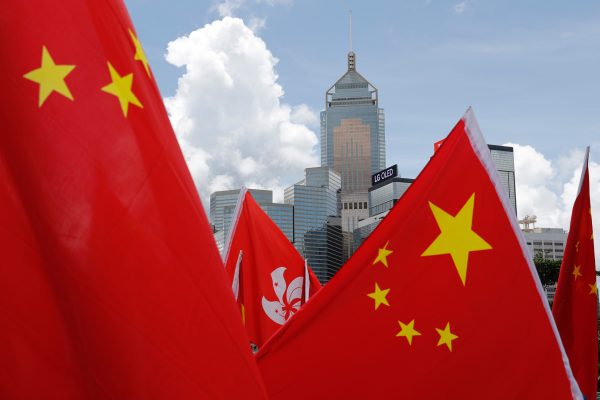The business community is concerned about the scope and enforcement of the law and how it may affect Hong Kong’s status as an international business centre. A recent survey by the American Chamber of Commerce found that over 80 per cent of US businesses surveyed are ‘concerned or very concerned’ about the new law.
But the likely damage done by the national security law should not be overstated. When Hong Kong was returned to China in 1997, a similar sentiment prevailed that it would be the end of Hong Kong as it was then known. But the fact is that Hong Kong has endured a sustained period of relative stability and prosperity under a high level of autonomy, even amid civil unrest. Fast forward to today, Hong Kong can and will continue to thrive as an international business centre, if the new law is implemented with restraint.
Beijing has affirmed that the national security law is narrowly focussed on four crimes: secession, subversion of central government, terrorism and collusion with foreign forces. Hong Kong retains final jurisdiction in all cases except for some unusually serious crimes. Given the scope and focus of the law, the Hong Kong business community in principle is in support of it, conceiving it as a legitimate move to maintain law and order in the territory.
The American Chamber of Commerce survey also shows that while US companies are concerned about the new law, over 70 per cent indicated that they won’t consider moving. Despite the risk that the law may be implemented in a way that reduces Hong Kong’s civil liberties, Hong Kong still remains an attractive business centre. It has had a long history of being a rule-based liberal business environment. It also has a large pool of productive workers with efficient infrastructure and it remains a critical gateway to mainland China.
As China further opens its US$45 trillion financial sector, Beijing is swiftly carrying out plans to expand the Greater Bay Area (GBA) cross-border transactions and investments, including wealth management, futures exchange, cross-border bank lending and payment services. Many international investors will seek investment opportunities in mainland China, and Hong Kong still remains an ideal nexus for such an endeavour.
Hong Kong has been a vital platform for Chinese companies to access dollar funding. As US–China economic tensions continue to escalate and the United States threatens to delist Chinese companies, many Chinese companies are considering relisting or secondary listing on Hong Kong stock exchanges. JD.com and NetEase have just raised billions of dollars by listing on Hong Kong exchanges. Hong Kong’s status as a financial powerhouse will only be elevated with US$600 billion capital inflow into Hong Kong over the next year.
The United States’ reaction to the passing of the national security law is another cause for concern. Immediately after the passing of the law, the US Commerce Department announced a ban on exports of defence equipment and sensitive high-tech products to Hong Kong. But these trade restrictions are symbolic, constituting a tiny sliver of total US exports to Hong Kong and are substitutable with imports from other countries.
On 15 July, Trump signed the Hong Kong Autonomy Act. While the Act does not mention tariffs or Hong Kong’s access to the US dollar payment system, there are a few possibilities looking ahead. First, the United States could remove the zero-tariff rate currently applied to Hong Kong imports and instead impose the same punitive tariff rates applied to mainland China. But it is not clear if the United States would continue to acknowledge Hong Kong as a member of the WTO separate from mainland China. Further, even if the tariffs are imposed, given that the United States exports far more to Hong Kong than it imports from it, any worsening of the terms of trade with the United States will have only limited impacts on Hong Kong’s economy.
Second, the United States may restrict investment into Hong Kong. But the current stock of US foreign direct investment in Hong Kong has reached US$82 billion, with over 1300 US firms operating there, and an annual sales of services of US$26 billion by majority US-owned affiliates. Curbing investment in Hong Kong will only dampen the profitability and competitiveness of US businesses.
Third, the United States could restrict access to dollar transactions by certain Hong Kong residents or businesses that are deemed to ‘back China’s efforts to restrict Hong Kong’s autonomy’ using the Hong Kong Autonomy Act. But it would have to provide evidence or reasons for imposing such restrictions for each case. Concerns about Hong Kong’s access to the US dollar may invite speculative attacks on the Hong Kong dollar.
Hong Kong’s US$440 billion worth of dollar reserves allows the Hong Kong monetary authority to confidently defend its currency. But restricting Hong Kong’s access to dollar transactions, if enacted at a large scale, will amount to relinquishing the US dollar’s dominance in the Asian markets and the global monetary system. Restricting Hong Kong’s dollar access will most likely only be used in a limited number of cases.
The new national security law is unlikely to ruin Hong Kong’s economic future provided that it is implemented as promised, that is, for prosecuting only a very small number of individuals who seek Hong Kong’s independence and self-determination. Undermining Hong Kong’s autonomy is not in the economic or political interests of Beijing, whose actions remain under close scrutiny from the international community.
Yan Liang is Professor and Department Chair at the Department of Economics, Willamette University, Oregon.

